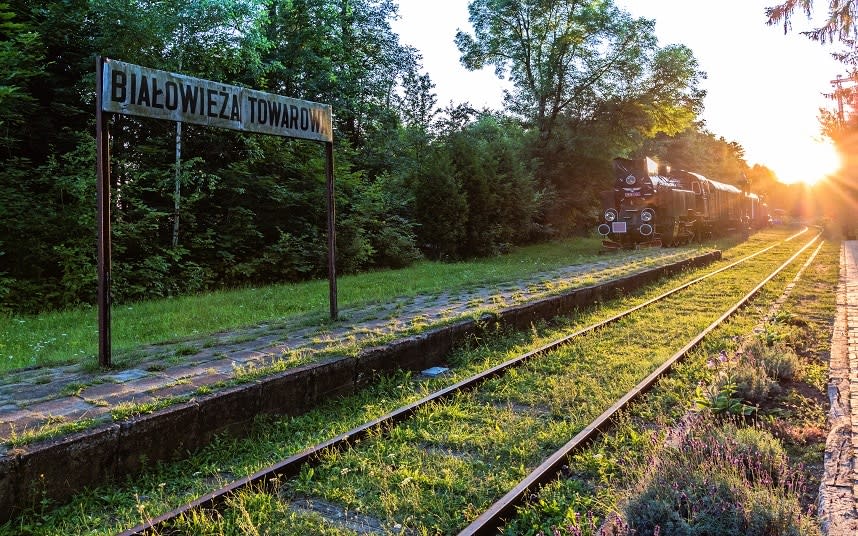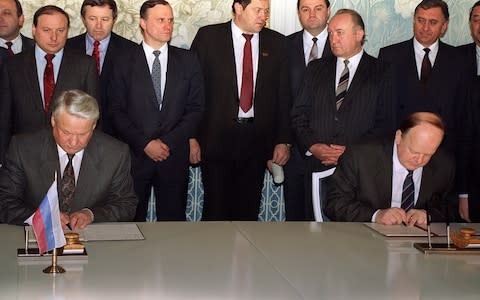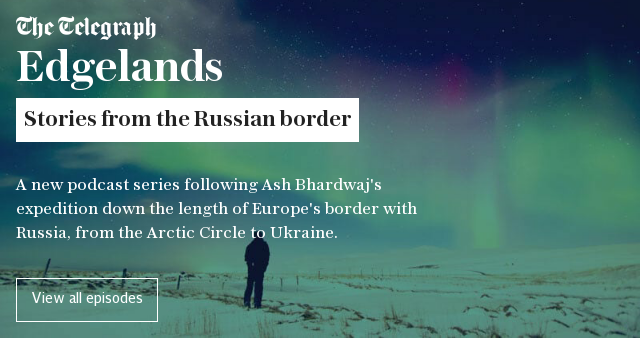Edgelands, episode 4: A close encounter in Białowieza Forest

Over the last three months, adventurer Ash Bhardwaj has been travelling Russia's long-contested European border, from the Arctic Circle to Ukraine. In this fourth episode of Edgelands, he visits Białowieza Forest - one of the last remaining tracts of the vast primeval forest that once spanned the European Plain.
Listen to the third episode of Edgelands using the player below. Registered users get early access to each new episode - click here to listen to episode three now.
Viewing this page on mobile? You can lock your phone screen and keep listening.

Episode four
In pictures and videos: minute-by-minute
01"35 The city of Grodno
02"15 "It feels like Poland"

02"31 "The last bastion of Sovietism"
A post shared by Ashwin Bhardwaj (@ashbhardwaj) on Jun 21, 2018 at 12:16am PDT
14"16 "The last vestige of primeval forest in Europe"

19"28 The signing of the Belavezha Accords

28"18 "I showed them the Hero Fortress in Brest"
In depth: behind the scenes of episode four
By Ash Bhardwaj
Ask most people about Belarus and they will trot out a line about it being "Europe’s last dictatorship", or Belarus being the last bastion of Sovietism. So it was an essential stop on my journey to explore the Soviet legacy in Europe.
I’d planned on taking a train from the Polish city of Bialystok to Minsk, the capital of Belarus, then take the train to Grodno and Brest. But whilst in Bialystok I learned that, in an effort to increase tourism, Belarus has introduced visa-free entry at certain ports of entry.

One of these was along the Augustow Canal towatds Grodno, via bicycle or kayak. Normally this is only allowed with an organised tour group, but I already had a tourist visa, and I guessed that, if one could enter by bike, one could also enter on foot.
So, cancelling my train from Bialystok, I headed north and, after two days walking, I arrived at the border. The Polish border guard let me through a white picket fence, and his Alsatian politely sniffed the contents of my bag. My passport was scanned by his colleague, who asked me my destination.
“Grodno,” I said.
“Good luck!” she replied, “Belarusian people are very nice!”
Receiving my passport with a smile, I exited a second picket fence and crossed the gates of the lock. The canal lock actually delineates the border here, and I stopped to take a photo of the red-and-white Polish border post facing the green-and-red Belarusian border post.

A few steps further, and I had arrived in Belarus. The only problem was that, far from the heavy security that I’d expected from a “dictatorship,” I couldn’t find a person in uniform. A search of a nearby building uncovered Sergei the border guard, who stamped my passport, pointed me in the right direction, and enthusiastically welcomed me to Belarus.
It turned out that I didn’t have enough time to walk all the way to Grodno, so I found a taxi in a nearby village. The driver and I took turns to play our favourite songs on the stereo and I stopped to take photos of old pillboxes and defensive lines in the vast green fields.
Grodno appeared between two hills, and initially looked as Soviet as I’d expected – grey tower blocks and vast red-and-white radio antennae. I checked into Hotel Belarus, which was originally run by InTourist, the old Soviet government tourist agency. It was a few miles from the town centre, and looked like it hadn’t been painted since the end of the Soviet Union, so I checked out and moved to the town centre instead.
As a former Polish city, Grodno is full of neo-classical buildings, framed around the gorge of the River Neman. Soviet architecture is limited to a few government buildings and the Theatre House, which looks more like a gothic spaceport than a place to tread the boards.
As a university town, Grodno is full of young people, and the bars to host for them. I had been recommended Bar Cuba by a friend, but found Cloud Bar, which had the same address. Instead of mojitos and salsa, I found beers and grime music – one of the regulars played me Big Shaq “Man’s Not Hot” in homage to my down jacket, and we spent the next few hours swapping musical insights and rounds of vodka.
The next morning I travelled south, for a far more sobering experience. The city of Brest took the full force of the Nazi blitzkrieg, and the six-week siege of Brest Fortress became the stuff of Soviet legend. It was given the title “Hero Fortress” after the war, and is home to the ultimate in Soviet monumental art: the statue “Courage”.
It’s a short bus journey from there to Belavezhskaya Pushca National Park, the patch of primeval forest, that Belarus shares with Poland. But when I reached the bus station ticket counter, the lady gave me a firm “Nyet” when I told her my destination and bus time.
“Can I help?” asked a nearby man, in perfect English.
I explained my predicament and he spoke to the ticket lady for a minute.
“I’m very sorry,” he said, “But the bus left an hour ago. There isn’t another for two hours.”
Checking my watch, I realised that I couldn’t get to the park and make my train to Minsk that night.
Suddenly my English-speaking companion returned, dragging someone behind him.
“You’re in luck,” he said, “There’s no state-run bus, but a private company runs the bus you are looking for. This guy will take you there.”
Following the now-confused bus conductor, I made it to the bus to find that my ticket was already paid for.
I looked back, but my new friend was already gone.
How to get there
Baltic Holidays create bespoke tours to Belarus and neighbouring countries: see www.balticholidays.com



